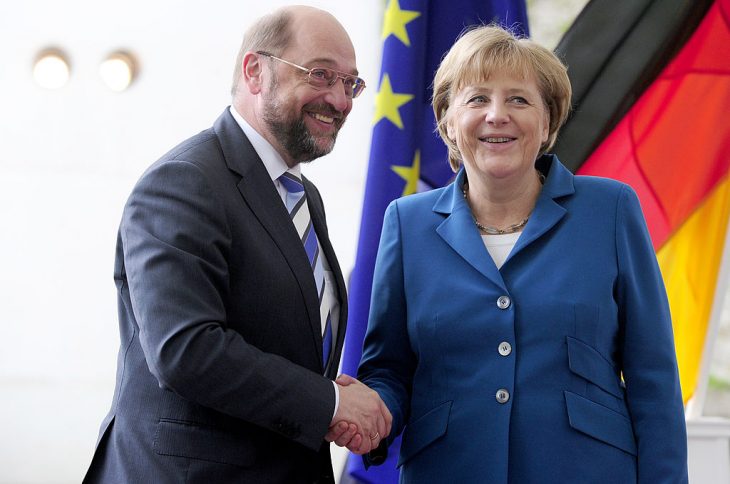There’s no success like failure, as Bob Dylan once observed. Nearly six months after Germans went to the polls and gave the country’s coalition government a bloody nose, the same two parties are back in government in another ‘grand coalition’ – yet another unholy alliance of Christian Democrats and Social Democrats, with Angela Merkel at the helm again.
Haven’t we been here several times before? Well, yes and no. Merkel’s centre-right CDU agreed a coalition deal with the soft-left SPD last month, but SPD protocol demanded they put this deal to their 464,000 members, and after an all-night count the result of that postal vote was announced this morning. As expected, SPD members have approved the terms of this latest grand coalition (or GroKo, as Germans call it) but the margin is wider than many pundits had anticipated: 66pc to 34pc, very nearly two to one.
This is a significant defeat for SPD radicals, personified by 28 year-old Youth Wing leader Kevin Kühnert, who’d campaigned against another GroKo. He’d argued that the party’s leftist identity would be even further undermined by yet another spell propping up Merkel’s conservative administration. He may well be right, but clearly most of his fellow members feel the deal the SPD struck last month (securing six cabinet posts, including the powerful Foreign and Finance Ministries) was simply too good to turn down.
Following months of negotiations, things will now move pretty quickly. The CDU and SPD will sign off the coalition agreement, and on 14th March (or thereabouts) the Bundestag will vote Merkel back in as Chancellor. After all that fuss and bother, Germany will be back with the same leader and the same government it had before. So is this the Teutonic equivalent of that legendary non news story, ‘Small Earthquake in Chile – Not Many Dead’?
Not really. Last time Merkel formed a coalition with the SPD, in 2013, she’d polled over 41pc, putting her CDU in the driving seat. This time her CDU still polled most votes, but their share was down to 32pc, the party’s worst result since the war. Everyone agrees she’s now on her last leg as Chancellor, and many German commentators doubt she’ll even serve a full term.
However the SPD performed even worse in September’s election, falling from 26pc to a historic low of 20.5pc. So how come they’ve made such big gains at Merkel’s expense, even wresting the Finance Ministry from her CDU? Because Merkel is determined to stay on as Chancellor, because the CDU don’t want to oust her, and because the SPD have played a weak hand very well.
The glue that binds the CDU and SPD together in this new GroKo is their shared fear of a fresh election, and an even stronger showing by Germany’s new anti-immigration party, Alternative für Deutschland. AfD polled 12.5pc in September – an unprecedented showing by a hard-right German party since the war. That gave them 94 seats in the Bundestag, the third biggest party behind the CDU and the SPD, and making them the official opposition in this new parliament. The latest opinion polls put them even higher, at 15pc – only a few points behind the SPD, who’ve slipped right down to 18pc.
After the election I asked a range of CDU and SPD politicians about AfD’s prospects. They all assured me that the spotlight of the Bundestag would reveal AfD to be unfit for office, and burst their populist bubble. On the contrary, this exposure has had the opposite effect – so far.
Unlike the SPD, the CDU vote has held firm since the election, nudging up to 34pc in the latest polls. So why didn’t Merkel risk a minority government, and dare the SPD to defeat her in a Faustian pact with AfD? In any other Western democracy, this might have been an effective tactic, but the nightmare of the 1930s still casts a long shadow over German politics. Germans still remember what happened the last time conservative politicians tried to play games with the electoral system, and the catastrophe that occurred.
‘No Experiments!’ promised Konrad Adenauer, founding father of postwar Germany, in 1957 – the year his CDU won over 50pc of the national vote (its best ever result). Sixty years later, that’s still the German way of doing things. The new GroKo will be dull and dreary, mired in compromise and stasis, but the CDU and the SPD will sleep easy knowing there will be no experiments. If there were, both parties would have far too much to lose.






Comments